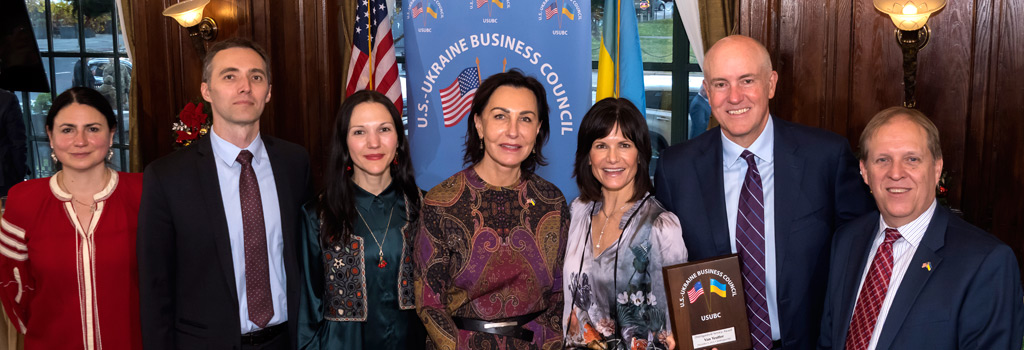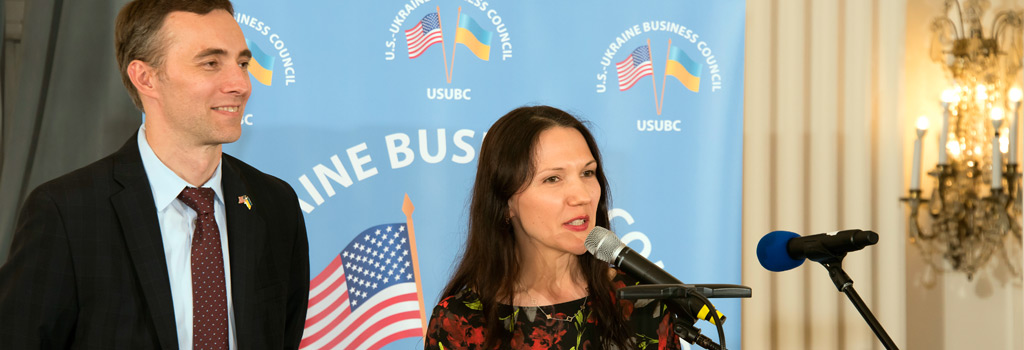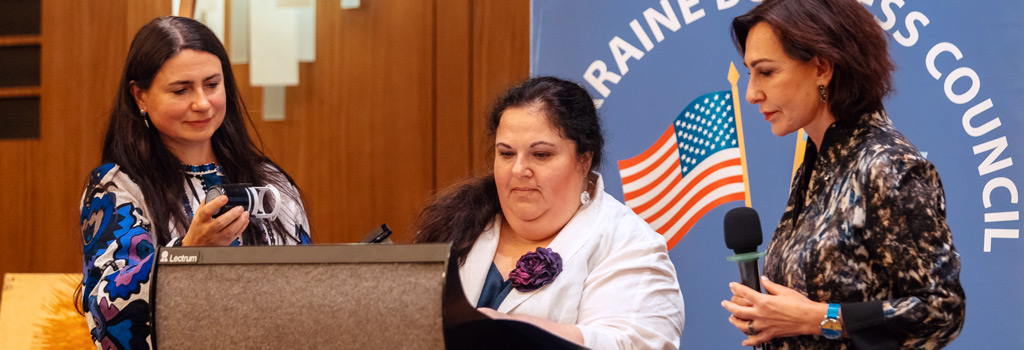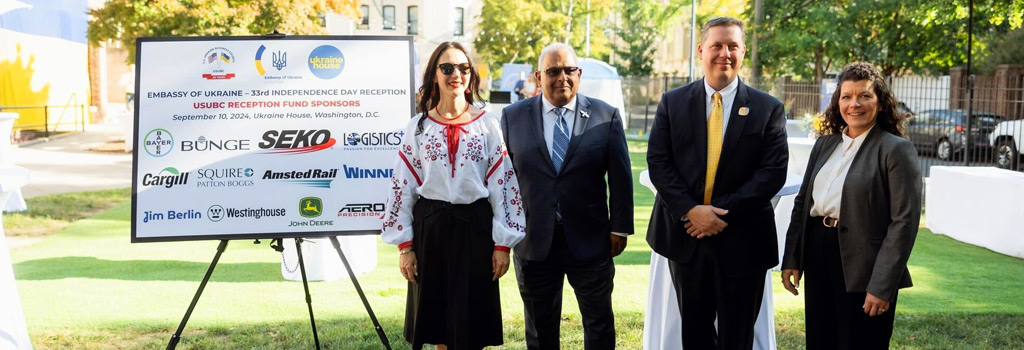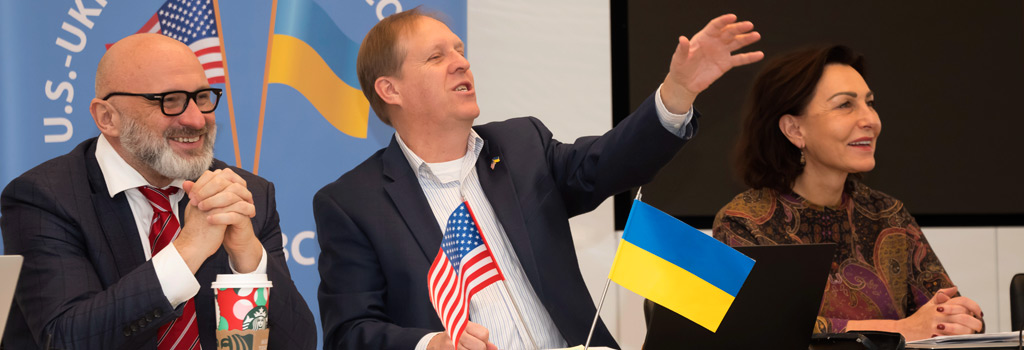Featured Galleries USUBC COLLECTION OF OVER 160 UKRAINE HISTORIC NEWS PHOTOGRAPHS 1918-1997
 Holodomor Posters
Holodomor Posters

A Canadian is fighting for change in Ukraine. So far, he's losing
 A Canadian is fighting for change in Ukraine. So far, he's losing
A Canadian is fighting for change in Ukraine. So far, he's losing
by Paul Wells, Fri, May 14, 2021, Toronto, Canada
TIU Canada is a member of U.S.-Ukraine Business Council
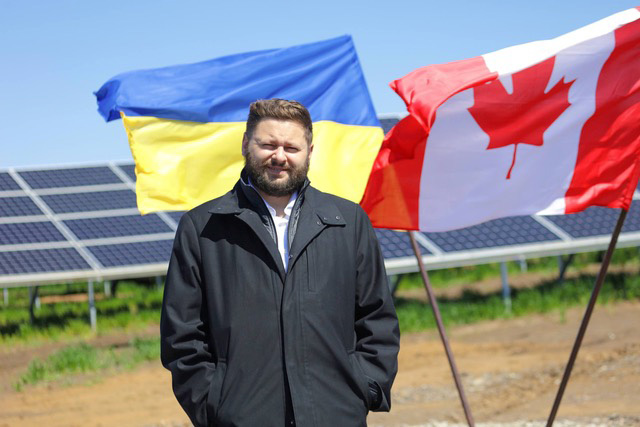 Michael Yurkovich launched a solar power project in Ukraine. The profits were good, the future was bright. Then he started to learn more about the neighbourhood.
Michael Yurkovich launched a solar power project in Ukraine. The profits were good, the future was bright. Then he started to learn more about the neighbourhood.
Right up until the day the oligarch next door cut off his ability to sell his product, Michael Yurkovich was marvelling at how easy it was to do business in the new Ukraine.
Yurkovich is from Calgary. His family has been in oil for decades. But Yurkovich seeks investment opportunity in various energy markets and technologies. In Ukraine, his product is solar power. In the rolling grassy fields outside the central Ukrainian city of Nikopol, where Yurkovich’s company TIU Canada set up row on row of solar panels to launch a 10.5 megawatt energy station in early 2018, solar was clean, plentiful and renewable. And, crucially for a country whose faltering steps toward independence are forever hobbled by its dependence on oil and gas from Russia, solar energy comes from the sky with no messy geopolitical strings attached.
Two other TIU plants came online elsewhere in Ukraine soon after the Nikopol station. In total, Yurkovich and his associates had $65 million invested in Ukraine, producing 54 megawatts of power altogether. It looked like a classic win-win-win proposition. Ukraine could bolster its credentials as a country opening up to the West after the bloody 2014 Maidan protest and the Russian invasion of Crimea. Canada could cement its regional influence: foreign ministers in two successive governments, John Baird and Chrystia Freeland, had each made supporting reform in Ukraine a personal priority. And Yurkovich could be a poster boy for the greening of the Alberta oil patch and for entrepreneurial environmentalism abroad.
Justin Trudeau’s government and Ukraine under the pro-reform presidency of Petro Poroshenko had signed a free-trade agreement. Everyone was talking about a new era for Ukraine. Sure, corruption was endemic, but in theory reform had a chance after Moscow’s puppet president, Viktor Yanukovych, was swept from office amid the chaos of 2014. Testifying to a Senate committee in support of the free-trade agreement in 2017, Yurkovich said prospects for Ukraine were bright, and Canada had a lot to do with it. “We have seen a marked improvement in reform,” he said. “By being clear and transparent, we have a large soft-power presence in that country because they know that the Canadians cannot be bribed. They cannot be intimidated. They cannot be corrupted.”
And the profits! TIU was a solar-energy play, but as he discussed other opportunities with the Canadian senators, Yurkovich mused about building wind farms too. In Calgary, he’d expect 3 per cent internal rate of return, or annual growth on his investment. In Ukraine he could expect an IRR of 28 per cent—nine times the return. “Literally the same technology from the major vendors… the same guys that work in Ontario. And we will be the only guys in that room.”
At the 2019 Ukraine Reform Conference in Toronto, TIU was everywhere. Volodymyr Zelensky, the television comic who’d managed to get himself elected as Ukraine’s populist president, held the company up as an example. “Green energy will be one of the key sectors of our economy during the upcoming years,” Zelensky said. “I know that we have here Canadian company TIU that already successfully works in this area. We are grateful to them for this. Please, follow their example.”
Then Yurkovich started to learn more about the neighbourhood.
TIU’s Nikopol solar station was on land leased from the city of Nikopol. But to get to it you had to go through a gate controlled by the factory next door, the Nikopol Ferroalloy Plant, whose Ukrainian acronym is NZF. It’s one of the world’s largest producers of manganese alloys used in the production of steel. And like a lot of other things in Nikopol—the soft-drink factory, the regional TV network, the local soccer and hockey teams—it’s owned by Ihor Kolomoisky, a billionaire investment banker and former governor of the Dnipopetrovsk oblast, or province, in which Nikopol is a mid-sized city. When the Soviet Union collapsed in 1991, the transition was chaotic. A few people made fortunes very quickly. Kolomoisky, a leading partner in the PrivatBank Group, made one of the biggest.
It’s handy to have connections in Ukraine, especially if you’re trying to sell electricity. Unfortunately, the TIU solar plant was connected to an energy substation on the grounds of NZF, Kolomoisky’s manganese factory. You see where this is going, don’t you. Two days before Christmas, 2019, TIU said in a statement, the Canadian company received a letter from the NZF factory manager announcing that the energy link would be disconnected for “repairs.” Nothing needed repairing, says TIU. Two months later, on March 1, 2020, the power line was cut. Yurkovich and TIU have been losing money, and seeking redress in Ukraine’s courts, ever since.
Seasoned observers of life in Ukraine aren’t fooled. This is nothing less than “a raider attack” on TIU’s assets by an “odious tycoon,” Roman Waschuk and Oleksiy Honcharuk wrote in an extraordinarily blunt assessment for the U.S. conservative magazine The National Interest. Waschuk was Canada’s ambassador to Ukraine from 2014 to 2019. A career diplomat since 1987, he arrived in Kyiv as ambassador soon after the bloody Maidan protests in 2014. Especially after Freeland became foreign minister at the beginning of 2017, he was Canada’s point man on efforts to make reform work. (This glum, occasionally grimly funny video talk from Waschuk last September is an excellent summary of why reform mostly hasn’t worked, if you have an hour to spare and are feeling excessively optimistic.) Honcharuk is a veteran advocate for reform who became Ukraine’s youngest-ever prime minister in 2019, at 35, and was turfed eight months later for criticizing Zelensky.
Cutting off TIU’s ability to sell its electricity was only the first part of Kolomoisky’s power play, note Washuk and Honcharuk. The next step was to offer to buy the solar plant at a “fair price,” now that the property’s value is collapsing.

Kolomoisky speaks with journalists in Kyiv, Ukraine on Sept. 13, 2019 (Valentyn Ogirenk/Reuters/Alamy)
The third step is playing out in Ukraine’s courts: a Kyiv court dismissed TIU’s claim against the NZF factory. NZF argued that it had no contractual obligation to transmit the solar plant’s energy—and also that it can’t be considered to have cut off the transmission line, since it could turn the line back on at any moment. The Kyiv judge took only a few minutes to decide the first argument on contract law was persuasive. TIU’s lawyers are convinced they have a strong case on appeal.
The appeal is dragging out. The next court date is scheduled for next week. This is an emergency for one Canadian investor. For everyone he’s up against, it’s business as usual. The grim status quo in Ukraine has all the time in the world. Meanwhile foreign direct investment in Ukraine has collapsed as hardy first movers like Yurkovich get stuck and investors who might have entered the market later pause to re-evaluate their prospects.
Kolomoisky did not respond to requests for comment sent to his factory and to his U.S. lawyer.
Kolomoisky is not the kind of guy you want to get in a fight with. His media properties helped make Zelensky president. Kolomoisky is the majority shareholder in the network that broadcast “Servant of the People”, a satirical TV show in which Zelinsky played a Ukrainian president. When the comedian launched a real-world political career, Kolomoisky’s station’s newscasts provided sympathetic coverage. When Rudy Giuliani was trying to dig up dirt on Hunter Biden, he tried to sweat Kolomoisky. The FBI raided Kolomoisky’s offices in connection with a massive money-laundering scheme that the FBI allege saw him buying up block after block of prime U.S. commercial real estate, only to let it fall into disrepair. Finally two months ago, Joe Biden’s new Secretary of State, Anthony Blinken, announced sanctions against Kolomoisky and his family as part of a renewed effort, against long odds, to kick-start reform in Ukraine.
The Ukrainian Canadian Congress is solidly in Michael Yurkovich’s corner. This is significant in itself, because you sometimes hear grumbling that this or that diaspora organization in Canada is more interested in staying on the good side of whoever’s in power back home than in promoting Canadian interests. But here’s a Ukrainian Canadian in a fight with business-as-usual in Ukraine, and the UCC has had no trouble picking sides.
From Canada’s government, however, not a peep. It’s good of Judy Sgro, the Liberal who chairs the Commons trade committee, to say a word on her Facebook page. Other MPs and senators from various parties have offered comments supporting Yurkovich. But it’s all isolated, not coordinated, and to a great extent this Calgary businessman seems to be on his own in a stacked fight against a neighbourhood bully in a foreign land.
Now, we’re sensitive these days in Canada about the independence of our judiciary, and nobody is asking Trudeau or his monumentally low-key foreign minister Marc Garneau, the fourth person to hold that post in five years, to demand any particular outcome.
But it’s an open secret in Ukraine that the courts are too often swayed by the oligarchs’ considerable influence.(This 2018 Financial Times story describes a campaign of legal harrassment against the Luxembourg-based multinational ArcelorMittal in a city near Nikopol; ironically the story references TIU as a relative good-news story in comparison. That was then.)
Zelensky, who owes his position as president to support from Kolomoisky’s media holdings, looks at Yurkovich and sees a guy from Calgary without a lot of friends in Nikopol. And back home in Canada, the government that used to toast TIU’s success has fallen silent.
But what Justin Trudeau said at the Ukraine Reform Conference in Toronto in 2019 was true. “A strong stable Ukraine is not only important for Canada, it is important for the entire world,” he said. “Upholding the rules-based international order is the clearest path to prosperity.”
As Canada used to remind Ukraine, that doesn’t just mean keeping Russia out. It means keeping a light on for fair play in the corridors of power in Ukraine itself. Canada, which has troops in Ukraine training their armed forces, more in Latvia backing up the West’s support for the region, and a large Ukrainian-Canadian community that used to be excited about prospects for an open, fair Ukrainian society, could encourage Zelensky to spend some political capital and make a point that in Ukraine’s courts, the guy offering clean energy and increasingly rare investment dollars deserves a hearing, and not just the guy on the State Department’s blacklist.
Introducing Trudeau at that 2019 conference, Chrystia Freeland noted that Vladimir Putin had just told an interviewer that “the liberal idea” was obsolete. “I can think of no country that more powerfully rebukes that idea—just in the way we are—than Canada,” Freeland said. Is that still true?





